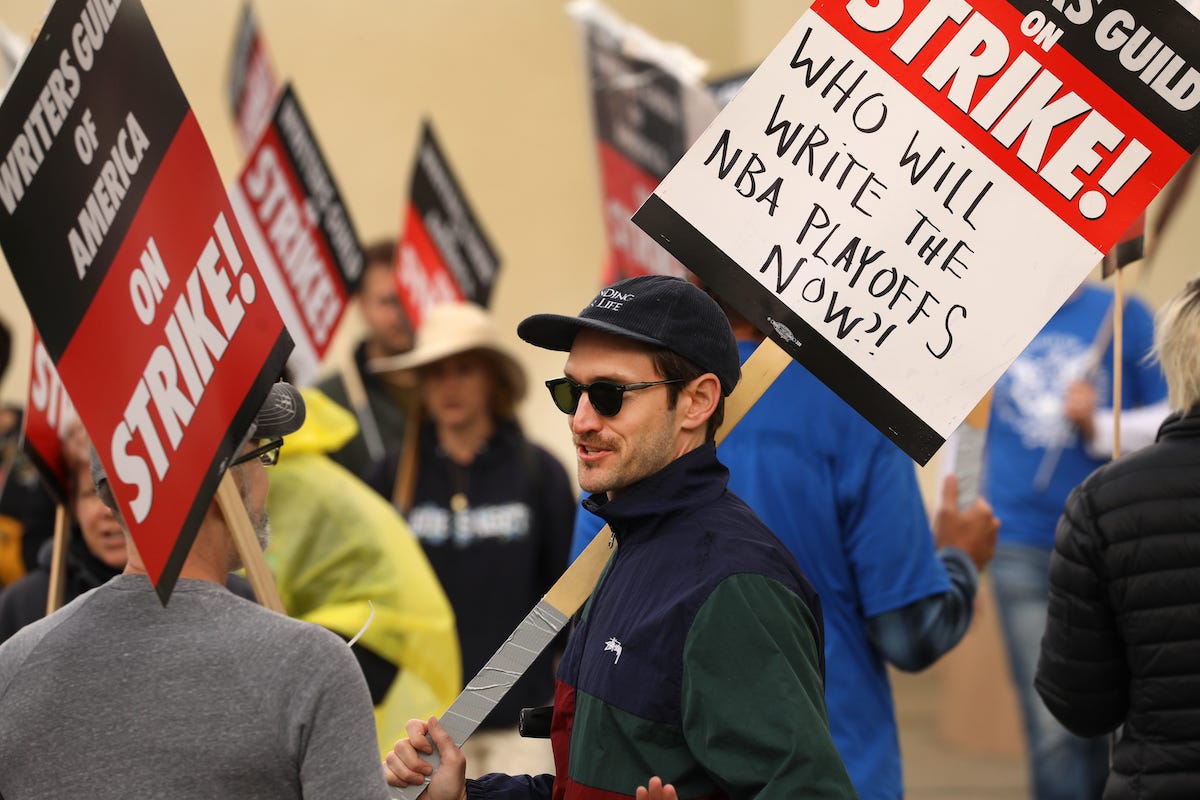The WGA’s Demands Are All Reasonable, Which Is Why This Will Be a Long Strike
Plus: 'Bupkis' assigned!
This week’s bonus episode of Across the Movie Aisle is on one Guy Ritchie, a personal fave. This is for Bulwark+ members only, so sign up now if you haven’t.
Anyone can come to our Across the Movie Aisle live show on Tuesday, May 16th, at 7:30 PM at the Alamo Drafthouse in Crystal City. Tickets are only seven bucks! We’re showing WarGames and talking about it afterward. There are only six seats left and while four are designated as handicapped spaces, they’re free for everyone at this point since we’re so close to a sellout. The Drafthouse has these really cool removable seats, so anyone can sit in them, even if you’re not in a wheelchair.

The Writers Guild of America has officially gone on strike, as we kind of assumed they would on Across the Movie Aisle this week and as many guests on The Bulwark Goes to Hollywood over the last year have assumed they would. I wouldn’t say I was surprised by this development, given the tenor of the conversation surrounding the strike for a while, but I had held out a little hope an agreement might be reached because the WGA wasn’t demanding what I thought they would be demanding, and that was radical data transparency. Data transparency is a thing I could see the streamers who dominate TV burning down the system to protect; spending a little more on writers' rooms feels like a penny-wise/pound-foolish sort of stance.
And, sure enough, the writers' demands are all, honestly, pretty reasonable. The WGA handed out a sheet with a list of demands and counters, and the most striking element of it are the number of demands that weren’t even met with a counter. Among these items were requests for larger writers' rooms and a request for a new residual structure that reflected how well a show performed on streaming. The rejection-without-a-counter that jumped out at me, however, was the one related to how agreed-upon pay is parceled out.
Here was the WGA’s ask: “WEEKLY PAY: 50% pay upon commencement, and remaining 50% to be paid out weekly over the writing period. Applies if writer is paid less than 250% of minimum; writers above this threshold have the right to opt-in to weekly pay.” Basically, the way it works now is that writers, after they are hired, get half up front and half when they deliver a draft acceptable to the studio. This seems fair enough, except for the fact that the studios will stretch out what is considered acceptable for as long as possible, asking for rewrite after rewrite, itself a questionable ask since most contracts stipulate a specific number of drafts. This means that writers end up doing lots of free work for extended periods.
And, you know, the world’s smallest violin and all that. Oh no, how dare they complain about having to do a little extra work to collect their six-figure checks, boo hoo. But I feel like it’s kind of important to understand that writers are doing free work all the time. Most of a working writer’s life in Hollywood is spent doing free work in the form of pitches, writing spec scripts, etc. I always find Colby Day’s year-end roundups eye-opening (2022 here, 2021 here), because it’s so often a series of fruitless meetings, Zooms with producers that go nowhere, sizzle reels that wind up flaming out, etc. I don’t think it’s unreasonable for writers, having finally found paying work instead of being forced to do the free work needed to acquire the pay, to ask to be paid for it in a timely fashion.
But it did come across to the AMPTP as so unreasonable they didn’t even bother to come back with a better idea. And that’s why this is destined to be a long, and potentially destructive, strike.
Links!
One more strike note: I’d like to echo David Poland’s point midway through this post about the fact that writers are simply reacting to a situation they didn’t create. They didn’t make the studios go all-in on streaming to appeal to Wall Street. They didn’t ask for the destruction of the residual model. They didn’t force mini-rooms on c-suites throughout California. I sympathize with the writers more than the studios in this situation for the same reason that I have sympathized with theater owners more than the studios during the pandemic-era rush to streaming. Neither writers nor theater owners asked for this, and we’ll all be worse off if a critical mass of writers and theaters can’t make it work, financially.
I reviewed Guardians of the Galaxy Vol. 3 this week; it’s the first time in a long time I’ve felt that old Marvel magic.
Hopefully, everyone enjoyed last week’s BGTH with Matthew Ball, author of “The Streaming Book.” This week I’m talking to Judah Miller, a showrunner on the new Pete Davidson show Bupkis, which is streaming on Peacock now and which I briefly review below.
A quick summer reading recommendation: I really enjoyed Nathan Ballingrud’s novel The Strange, which is a bit like Ray Bradbury’s The Martian Chronicles by way of Charles Portis’s True Grit. I knocked it out in about 24 hours, so it’s a quick read. (I am, generally, a very slow reader, so most of you will likely finish it even quicker than I did.)
Assigned Viewing: ‘Bupkis’ (Peacock)
You can watch the whole season now and I recommend checking it out because I enjoyed it quite a bit, though I will say it took me three episodes to really get into it. By the fourth—which is maybe the best of the first season—I was totally sold. But Bupkis is doing something interesting, in that it’s playing with different genres and different styles and different moods in each outing. I don’t know that it’ll work for everyone, but the fourth episode’s remix of The Fast and the Furious by way of Red Rocket is kind of genius. At the very least, you owe it to yourself to watch through the third episode in which Charlie Day of Always Sunny fame plays Pete’s psychiatrist. Plus: Joe Pesci is in this show! Joe Pesci will work with exactly two people: Martin Scorsese and Pete Davidson. That’s how you know it’s good.




Re: Bupkis, I'm guessing you meant fourth episode instead of fourth season. I was hesitant to dive into another show, but I'll give it a shot now after I watch this week's episode of (the severely underrated and underpromoted) Mrs. Davis.
Re: WGA strike...it really is kinda amazing just how few major labor disruptions there have been over the last 25 years. Once upon a time in America, strikes of all sorts (miners, factory workers, teamsters, actors, journos) were so common you could practically set your watches by them. The fact a strike like the WGA's has become so uncommon I can't help but feel reflects two changes to our economy over time:
1) A cultural resentment of unions as the pay & benefits fought for and won by the pioneering unionizers went from new and emergent to something more than just the expected baseline but the expected minimums, often in fields beyond those which had unionized.
2) The actual cost of going on strike has risen to the point that even when the workers understand they probably should strike for better pay or benefits, they literally can't afford to, even when they live in two income houses. Somewhere in there is a potentially fascinating graduate thesis for an economist, but the rise in the cost of living over the past, eh, 50 years or so is so drastic it really is no surprise that in the wake of the pandemic's "pause" giving people a vision of how things (for some) can clearly be better, they're choosing to fight for that "better".
Lastly, I gotta say, I think the deathgrip on the streaming metrics by the studios is ultimately self-defeating. Data without context is utterly meaningless and I highly doubt most studio execs have the acumen to truly understand the context often required. Not because they're dumb people, I don't think they are, but because for every Bob Iger there's 5 Michael Eisner's
Sonny - thank you for this. Incredibly informative. I really enjoyed reading Colby Day's 2021 and 2022 in review from his position as a screenwriter.